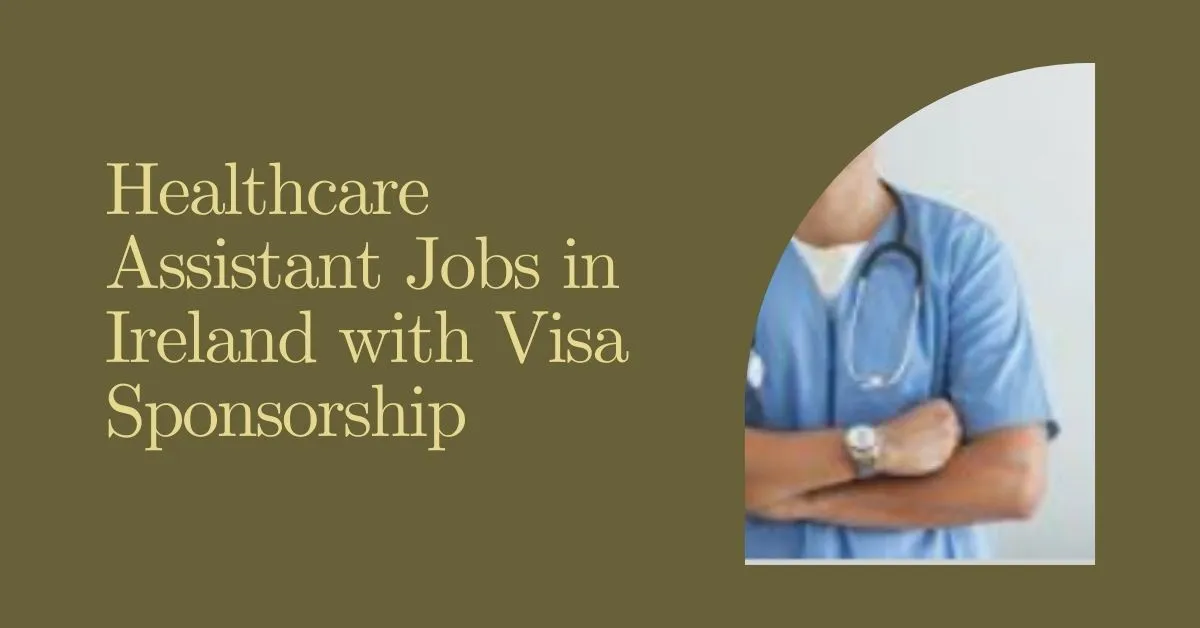Healthcare Assistant Jobs in Ireland with Visa Sponsorship

Ireland is calling for help. As its population ages, a quiet crisis is unfolding in hospitals and nursing homes: a profound shortage of compassionate hands to provide essential care. This is not just a job opportunity; it is a heartfelt plea for skilled healthcare assistants to become the backbone of Ireland’s healthcare system. If you are a dedicated individual who finds purpose in serving others, your compassion is needed now more than ever.
Ireland is responding by offering visa sponsorship, a stable salary of €1,800 – €2,500 per month, and a chance to build a meaningful life in a welcoming country. This guide details the requirements—from proven experience and English proficiency to the invaluable QQI Level 5 certificate—and the comprehensive benefits that await you, including paid leave, pension contributions, and relocation support. Your journey to making a real difference starts here.
Why Ireland Desperately Needs Healthcare Assistants
Ireland is facing a significant demographic shift. Its population is aging rapidly, mirroring a trend across many developed nations. This, combined with a critical shortage of local care workers, has created an urgent and sustained demand for skilled Healthcare Assistants (HCAs).
Hospitals, nursing homes, and home care providers across the country are actively seeking to fill this gap and are increasingly offering visa sponsorship to qualified international applicants. If you are a compassionate, hard-working, and dependable individual, you are their ideal candidate.
The Role of a Healthcare Assistant (HCA)
An HCA is not a doctor or a nurse, but you are an indispensable part of the healthcare team, providing essential daily support that makes a profound difference in patients’ lives.
Your daily responsibilities will typically include:
- Assisting patients with personal care tasks like bathing, dressing, and eating.
- Helping with mobility, including walking and transferring from bed to chair.
- Monitoring and recording vital signs and reporting any changes to nursing staff.
- Supporting nurses with basic medical tasks.
- Maintaining accurate patient records regarding behavior and mood.
- Offering emotional support and companionship to patients and their families.
- Ensuring a safe, clean, and hygienic environment.
You could be employed in various settings, including public and private hospitals, nursing homes, community care centres, or through private home care agencies.
Eligibility: Who Can Apply?
Ireland welcomes dedicated HCAs from around the world. Ideal candidates typically are:
- Aged between 21 and 50.
- Possess 1–2 years of relevant care experience (this can be paid or voluntary).
- Can communicate effectively in English (essential for safety and care).
- Demonstrate compassion, respect, and immense patience.
- Are willing to relocate to Ireland and work flexible shifts, including nights and weekends.
Qualifications: A QQI Level 5 Certificate in Healthcare Support is a significant advantage. However, many employers accept relevant international qualifications or provide on-the-job training to committed individuals with proven experience. Former nurses, paramedics, or caregivers from other countries are highly valued.
Visa Sponsorship: How It Works
Visa sponsorship means an Irish employer, approved by the government, will facilitate your legal employment in Ireland.
The standard process is:
- You receive a formal job offer and contract.
- Your employer applies for a Critical Skills Employment Permit or a General Employment Permit on your behalf.
- You submit your visa application to the Irish Naturalisation and Immigration Service (INIS) with the permit.
- Once approved, you receive your visa to enter and work in Ireland.
This is a full, renewable work permit, typically valid for two years. After five years of legal residence, you may become eligible to apply for long-term residency.
Salary and Employment Benefits
The role of an HCA in Ireland offers a stable income and comprehensive benefits.
- Salary: €1,800 – €2,500 per month (or €11.50 – €14 per hour), often with additional pay for overtime, nights, and weekends.
- Common Benefits Package:
- Paid annual leave and sick leave.
- Employer pension contributions.
- Free uniforms and protective equipment.
- Support with visa paperwork and orientation.
- Many employers also offer subsidised accommodation, flight reimbursement, or airport pickup.
Where Are the Jobs Located?
Opportunities are available nationwide, with high demand in both urban and rural areas:
- Dublin: The capital city has the highest concentration of major hospitals and care facilities.
- Cork & Galway: Vibrant cities with large university hospitals and a growing elderly population.
- Limerick, Waterford, and Kilkenny: Smaller cities with strong community healthcare needs.
- Rural Areas: High demand for home care and in local community nursing units.
Being flexible with your location significantly increases your chances of being hired.
How to Apply For Healthcare Assistant Jobs in Ireland
Step 1: Prepare a Professional CV
Your CV should be clear, concise, and no longer than two pages. It must include:
- Full name, contact details, and nationality.
- A detailed summary of your relevant work history and care experience.
- English language proficiency.
- All relevant certifications and training (e.g., first aid, care certificates).
- A clear statement of your willingness to relocate and need for visa sponsorship.
- References from previous employers.
Step 2: Search for Jobs Strategically
Use precise keywords in your online search:
- “Healthcare Assistant Ireland visa sponsorship”
- “HCA jobs Ireland employment permit”
- “Care assistant jobs Ireland for overseas applicants”
Key Platforms to Use:
- IrishJobs.ie
- Jobs.ie
- Indeed.ie
- HSE.ie (the official website of Ireland’s public health service)
- Specialist healthcare recruitment agencies (e.g., CPL, TTM Healthcare)
Crucially, only apply to listings that explicitly mention visa sponsorship.
Step 3: The Interview and Offer Process
If shortlisted, you can expect:
- A video or phone interview.
- Potential English language or skills assessment.
- Requests for documents: passport, qualification certificates, police clearance, and character references.
Conclusion
The role of a healthcare assistant in Ireland is far more than a job; it is a vocation of immense value and respect. Ireland is not just offering employment; it is offering a partnership to those willing to provide essential, compassionate care to its citizens.
The path is clear: with dedicated employers ready to sponsor visas, a supportive benefits package, and a nationwide need for your skills, the opportunity to build a stable and deeply fulfilling life in Ireland has never been greater. By preparing a strong application and demonstrating your genuine commitment to care, you can answer this call. Your compassion is your greatest qualification—and Ireland is ready to welcome it.
Frequently Asked Questions
Can I bring my family with me to Ireland?
Yes, this is possible, particularly if you secure a Critical Skills Employment Permit, which allows for immediate family reunification. With a General Employment Permit, you must meet a minimum earnings threshold before your family can join you.
What is the realistic monthly take-home pay after tax?
The gross salary of €1,800 – €2,500 per month is before tax. Your net pay will depend on your personal tax credits. As a rough estimate, you can expect to take home approximately 75-80% of your gross salary after taxes and social insurance deductions.



